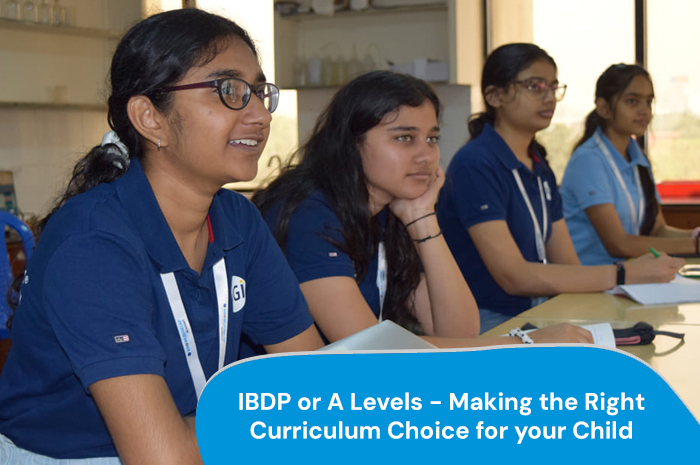For parents whose children are on the threshold of entering high school, the next two years are critical to determining which college the child is accepted to. A-Levels, offered by Cambridge International Education Board and IBDP offered by International Baccalaureate Organisation are two widely recognised and globally accepted courses. Both courses are intensive pre-university programmes that follow a progressive curriculum and deeply engage learners. Though both courses fulfil college admission requirements, they take varied approaches. Let us understand their curriculum to help you make the right choice for your child.
The course aim of A-Level and IBDP is to promote independent learning and critical thinking abilities in learners. Both courses are designed to promote an international mindset among learners and groom them to become global citizens, who adapt to the evolving society. The courses are designed to instil essential skills for college learners that make them independent thinkers and researchers.
The IB Diploma Programme takes an interdisciplinary approach to learning. A learner chooses 6 courses from 6 subject groups without being siloed in any single branch of learning. The six subject groups are Mathematics, Science, Studies in Language and Literature, Language Acquisition, Individuals and Societies, and Arts. Learners must choose one course from each subject group, although Arts group subjects are electives. Thus, learners can choose courses that -
Further, each course is offered in Higher Level (HL) and Standard Level (SL) and the learner must choose at least three HL courses. Thus, for those learners who are weak in any of the compulsory courses, or the course is not relevant to their college programme, they can opt to take it as an SL. Apart from academics, the programme has three core components, that is,
ToK and EE are graded activities, and the learners have to complete 150 hours of CAS to earn their diploma. Through these core elements, the learners are introduced to important skills for college education, career and their future lives. The EE is a 4000-word essay which has to be presented in the form of a well-researched academic paper with proper citations. For ToK the learner makes a presentation and writes a reflective report on the importance of knowledge. Finally, as the name suggests, CAS requires learners to participate in extracurricular activities and write reports on them. All these aspects, along with the internal and external course assessments contribute towards building a strong academic profile. This improves a candidate’s chances of getting admission to their desired college programme.
In the Advanced Level or A-level, a learner must choose a minimum of 3 subjects, though they can choose up to 5 subjects. Learners can choose these subjects from the Sciences, Humanities, Languages, Commerce and Fine Arts courses. Though learners are not tested for the interdisciplinary application of concepts and theories in A-Levels, they have the freedom to choose the course that they find interesting, or is a requirement for the college programme admission.
IBDP has a points-based system, with each course carrying 7 points, and the learner has to score a minimum of 4 points in each course. 3 points are assigned to ToK and EE. So, the total number of points is 45 and learners have to score a minimum of 24 points to earn their Diploma. A-Level learners are graded A-E, with A being the top grade.
IBDP is a more demanding programme compared to A-Levels in terms of the breadth of the course and curriculum. Comparatively, A-Levels are more focused and though a learner can opt for only three courses, they learn it in depth. IBDP involves learners in a range of academic and non-academic activities which helps them develop many useful skills for college such as time management, organisation, communication, and presentation. Furthermore, the activities are carefully documented and contribute to the learner’s portfolio. When the learner is preparing their statement, these experiences will contribute towards strengthening their application.
There is no indication that universities show a greater preference for IBDP or A-Levels in the admission process. So, parents must consider their child’s personal interest, learning style, and the course and curriculum when they are deciding which board to choose. The school that is offering the course is also an important factor to consider, because how well the programme is executed also matters. So, choose the course and the school that best facilitates your child’s goals.
© Knowledgeum
